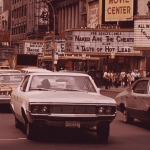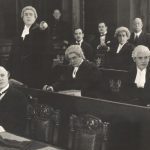 History
History  History
History  Health
Health 10 Everyday Activities That Secretly Alter Consciousness
 History
History Top 10 Historical Disasters Caused by Someone Calling in Sick
 Animals
Animals 10 New Shark Secrets That Recently Dropped
 Movies and TV
Movies and TV 10 Forgotten Realities of Early Live Television Broadcasts
 Technology
Technology 10 Stopgap Technologies That Became Industry Standards
 Weird Stuff
Weird Stuff 10 Wild Facts About Taxidermy That You Probably Didn’t Know
 Travel
Travel 10 Beautiful Travel Destinations (That Will Kill You)
 Miscellaneous
Miscellaneous 10 Modern Marriage Rituals Born from Corporate Branding
 Weird Stuff
Weird Stuff Ten Bizarre Visions of 2026 from Fiction
 History
History 10 “Modern” Problems with Surprising Historical Analogs
 Health
Health 10 Everyday Activities That Secretly Alter Consciousness
 History
History Top 10 Historical Disasters Caused by Someone Calling in Sick
Who's Behind Listverse?

Jamie Frater
Head Editor
Jamie founded Listverse due to an insatiable desire to share fascinating, obscure, and bizarre facts. He has been a guest speaker on numerous national radio and television stations and is a five time published author.
More About Us Animals
Animals 10 New Shark Secrets That Recently Dropped
 Movies and TV
Movies and TV 10 Forgotten Realities of Early Live Television Broadcasts
 Technology
Technology 10 Stopgap Technologies That Became Industry Standards
 Weird Stuff
Weird Stuff 10 Wild Facts About Taxidermy That You Probably Didn’t Know
 Travel
Travel 10 Beautiful Travel Destinations (That Will Kill You)
 Miscellaneous
Miscellaneous 10 Modern Marriage Rituals Born from Corporate Branding
 Weird Stuff
Weird Stuff Ten Bizarre Visions of 2026 from Fiction
10 ‘Patriotic’ Songs That Actually Criticize America
Every Fourth of July, or any time really, Americans crank up tunes that sound patriotic on the surface. Those stirring anthems with catchy choruses often hide deeper meanings that aren’t exactly singing America’s praises. The truth is, some of our most beloved “patriotic” classics were actually written as pretty harsh takedowns of American society, politics, and values.
This whole misunderstanding situation has even earned a nickname – the “Born In The USA effect” – where songs get completely misread as flag-waving anthems when their lyrics are telling a totally different story. These musical mix-ups happen across all generations and political stripes, with everyone from politicians to advertisers or even your uncle at the BBQ missing the pointed critiques hiding in plain sight.
10American Woman – The Guess Who
Loads of people think this 1970 rock hit is celebrating hot American babes, but these Canadian guys were actually penning a protest against American militarism during Vietnam. The “American woman” symbolizes war-hungry values, not an actual woman. Randy Bachman, the band’s guitarist, flat-out said it was commentary on the war, explaining they’d rather stay north of the border than deal with the chaos they saw while touring the States. The lyrics literally say “I don’t need your war machines, I don’t need your ghetto scenes” – not exactly subtle if you’re paying attention. Singer Burton Cummings tried to soften it a bit, saying it was more cautionary than overtly political, but the anti-war vibe is still front and center.
9Rockin’ in the Free World – Neil Young
When Neil dropped this track in 1989, its pumped-up chorus fooled many into thinking it was a celebration of American freedom. In reality, the verses paint a pretty grim picture of life under George H.W. Bush – poverty, environmental mess, and drug problems galore. Despite its critical stance, politicians from both sides have co-opted it, with both Trump and Bernie Sanders using it at rallies. (Trump’s usage earned him a lawsuit from the artists himself.) Young meant the chorus to be ironic – the whole “rockin’ in the free world” thing stands in stark contrast to verses about a mom abandoning her kid and people sleeping on the streets. He even takes a dig at Bush’s “thousand points of light” catchphrase while describing a society where consumerism rules and the vulnerable suffer.
8Pink Houses – John Mellencamp
With that earworm refrain “ain’t that America, for you and me,” this 1983 hit gets mistaken for a heartland anthem celebrating simple American life. But Mellencamp was actually calling out the crumbling American dream and deep-rooted inequality. The song introduces us to characters like an old Black man who technically “owns his own mansion” but gets overlooked by society, and a young couple whose dreams start fading once reality hits. That repeated “ain’t that America” isn’t celebratory – it’s sarcastic, challenging listeners to face the gap between American myths and American reality. Politicians keep missing the memo though – John McCain used it during his 2008 campaign until Mellencamp basically said, “Dude, have you actually listened to the lyrics?”
7Last Train To Clarksville – The Monkees
Almost nobody realizes this bouncy 1966 pop hit is actually a Vietnam War protest song. Underneath that catchy melody is a story about a soldier saying one last goodbye before shipping off to war. The guy calls his girlfriend and begs her to meet him at the train station for one final night together, not knowing if he’ll ever make it back. Songwriters Tommy Boyce and Bobby Hart deliberately disguised their anti-war message to avoid drama when Vietnam was becoming super divisive. The line “I don’t know if I’m ever coming home” gives away the game if you’re listening closely. By keeping things vague, they scored a massive hit without anyone raising eyebrows at the politics – pretty sneaky for a band created for a TV show.
6American Girl – Tom Petty
While often blasted as a celebration of American femininity and freedom, this 1976 rock classic actually tells a story of someone feeling trapped and disillusioned. The lyrics describe a woman who “couldn’t help thinking that there was a little more to life somewhere else” – not exactly a ringing endorsement of the American dream. We find her alone on a balcony, thinking about escaping her circumstances. It’s not as in-your-face political as other songs here, but it captures that feeling of restlessness that challenges the whole American contentment myth. The character’s hopes are compared to “promises” that sound like “the cars down in the highway” – distant and maybe unreachable. This subtle critique gets lost in the song’s driving guitars and catchy hooks.
5Independence Day – Martina McBride
That title and anthemic chorus have tricked many into making this 1994 country hit a July 4th staple, mistaking it for a patriotic celebration. In reality, “Independence Day” tells the disturbing story of a woman who escapes her abusive husband by burning down their house with him inside while their daughter watches from a distance. Songwriter Gretchen Peters used Independence Day as a metaphor for breaking free from domestic violence, not waving the American flag. When the chorus declares “Let freedom ring,” it’s about liberation from abuse, not national pride. The irony of hearing this one blasting at political rallies is pretty thick, considering its actual message about domestic violence and one woman’s desperate escape plan.
4America – Simon & Garfunkel
Many folks hear this 1968 folk-rock tune as a nice road trip song celebrating America’s beautiful landscapes and freedom. But Paul Simon’s lyrics actually describe a journey that ends in disappointment rather than fulfillment. The narrator and his companion “Kathy” travel across the country searching for “America” in both the literal and symbolic sense, only to find emptiness and disconnection. The line “they’ve all come to look for America” suggests a nation whose ideals remain just out of reach. Released during the tumultuous late ’60s, the song captures the feeling of a country that’s lost its way. The image of characters counting cars on the New Jersey Turnpike underscores their inability to find any real meaning or purpose in their journey. There’s a melancholy that runs through the whole song that’s more sobering reflection than celebration.
3Fortunate Son – Creedence Clearwater Revival
This 1969 rock banger kicks off with “Some folks are born made to wave the flag,” but then immediately pivots to ripping into class privilege during Vietnam. John Fogerty wasn’t exactly subtle – the song highlights how rich kids could dodge the draft while working-class Americans got shipped off to die. Yet somehow it keeps popping up in patriotic playlists and Wrangler jeans commercials. The lyrics specifically call out how senators’ sons and millionaires’ kids rarely found themselves face-down in a jungle somewhere. It’s a classic example of a song that’s not anti-military but definitely anti-inequality – a distinction that flies over a lot of heads.
2This Land Is Your Land – Woody Guthrie
Think of it as America’s unofficial second anthem, taught to kids across the country. But Woody Guthrie actually wrote this one in 1940 as a direct clap-back to hearing “God Bless America” played to death. He even originally called it “God Blessed America for Me,” which tells you something about his attitude. The verses we all learned in school celebrate America’s natural beauty, but Guthrie’s full version included some serious side-eye about Depression-era inequality. Two verses that rarely make the cut mention hungry people standing in relief lines and question private property ownership with the pointed line “As they stood there hungry, I stood there wondering if this land was made for you and me.” Woody initially kept those spicier verses under wraps, fearing blowback during America’s Red Scare freakout.
1Born in the USA – Bruce Springsteen
Probably the granddaddy of all misunderstood American songs, Springsteen’s 1984 anthem blasts from speakers at patriotic events despite being a gut-punch critique of how America treated its Vietnam vets. That fist-pumping chorus masks lyrics about a guy who was “sent off to a foreign land to go and kill the yellow man” only to come home to a country that basically said, “Thanks for nothing, pal.” The misreading started almost immediately when Reagan name-dropped it during his ’84 campaign, completely whiffing on its anti-war message. As Bruce later said, it became “one of my greatest and most misunderstood pieces of music.” The irony train keeps rolling – even in 2020, Trump supporters blared it outside the hospital where he was getting COVID treatment, continuing decades of political tone-deafness.








